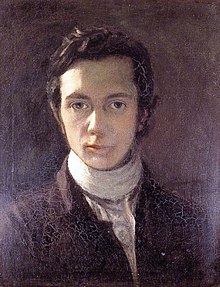
Back وليم هازلت Arabic وليم هازلت ARZ ویلیام هزلت AZB William Hazlitt Catalan William Hazlitt Czech William Hazlitt Welsh William Hazlitt German Ουίλιαμ Χάζλιτ Greek William Hazlitt Esperanto William Hazlitt Spanish
William Hazlitt | |
|---|---|
 Self-portrait from about 1802 | |
| Born | 10 April 1778 Maidstone, Kent, England |
| Died | 18 September 1830 (aged 52) Soho, London, England |
| Occupation |
|
| Education | New College at Hackney |
| Literary movement | Romanticism |
| Notable works | |
| Spouse |
|
| Children | William Hazlitt |
| Parents | William Hazlitt (father) |
| Relatives |
|
William Hazlitt (10 April 1778 – 18 September 1830) was an English essayist, drama and literary critic, painter, social commentator, and philosopher. He is now considered one of the greatest critics and essayists in the history of the English language,[1][2] placed in the company of Samuel Johnson and George Orwell.[3][4] He is also acknowledged as the finest art critic of his age.[5] Despite his high standing among historians of literature and art, his work is currently little read and mostly out of print.[6][7]
During his lifetime he befriended many people who are now part of the 19th-century literary canon, including Charles and Mary Lamb, Stendhal, Samuel Taylor Coleridge, William Wordsworth, and John Keats.[8]
- ^ "A master of English prose style, a beautifully modulated general essayist, the first great theatre critic in English, the first great art critic, a magnificent political journalist and polemicist ... Hazlitt is both a philosopher and one of the supreme literary critics in the language." Paulin, "Spirit".
- ^ Jacques Barzun praises Lionel Trilling as just behind Hazlitt, implying that Hazlitt, ahead of Coleridge, Bagehot, and Arnold as well, is in the top rank of English-language literary critics. Quoted in Philip French, Three Honest Men: Edmund Wilson, F. R. Leavis, Lionel Trilling (Manchester, U.K.: Carcanet Press, 1980), cited in Rodden, Trilling, p. 3.
- ^ "... in the tradition of the English essay, descended from Johnson, Lamb, Hazlitt, and Orwell", Hitchens on Display, by George Packer, in The New Yorker, 3 July 2008
- ^ Irving Howe considered Orwell "the best English essayist since Hazlitt, perhaps since Dr Johnson". "George Orwell: 'As the bones know' ", by Irving Howe, Harper's Magazine, January 1969.
- ^ A. C. Grayling notes that Kenneth Clark "described Hazlitt as the 'best critic of art before Ruskin'." Grayling, p. 380. See also Bromwich, p. 20.
- ^ "Most of Hazlitt's work is out of print, or unavailable in paperback. He is not studied in most university English courses ...", Paulin, "Spirit".
- ^ "Both Deane and Heaney had studied Hazlitt at school in Derry in the 1950s – he'd been replaced by Orwell when I took the same A-level course in the 60s, and the diminution of his reputation has been fairly steady until recently." Paulin, "Spirit".
- ^ Grayling, pp. 209–10.
© MMXXIII Rich X Search. We shall prevail. All rights reserved. Rich X Search